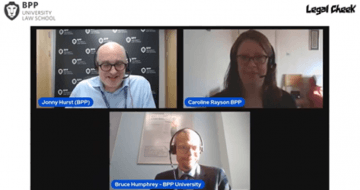Legal Cheek Careers sits down with BPP Law School’s Head of Outreach and Student Recruitment, Jonny Hurst, to discuss exams, course funding and QWE, ahead of his appearance at Thursday’s virtual event

Flexibility is one of the Solicitors Qualifying Examination’s (SQE) biggest selling points, and will be a boon to many people who otherwise might have struggled to qualify as a solicitor, whether due to financial reasons, care responsibilities, or another reason.
The aim of the SQE is to tear down barriers, but do any tripwires still exist and, if so, what are they?
Perhaps the biggest concern for the Solicitors Regulation Authority (SRA) is bridging the attainment gap between white, Asian and black candidates. The SRA has appointed the University of Exeter to get a greater understanding of what is driving this gap and the steps that are required to close it. Jonny Hurst, Head of Outreach and Student Recruitment at BPP University Law School, comments: “This is a long awaited piece of research, but we have to be realistic in terms of its immediate impact: any change to level up the playing field by following any recommendations is likely to take some time.”
Hurst continues: “Whilst the attainment gap is not unique to the SQE or the legal profession and some aspects of the SQE make qualifying as a solicitor more accessible, there may be a number of unintended consequences of the new pathway which work against the EDI [equity, diversity and inclusion] agenda.”
One concern is that students misunderstand the true cost of the SQE pathway. On this Hurst says: “We hear the SQE is cheaper than the Legal Practice Course (LPC) — and in one sense that is true if you choose the quickest, cheapest courses, or perhaps no course at all. But most candidates need or are looking for a course which prepares them for practice on at least a par with the LPC so they can remain competitive.” He adds: “Whilst a number of ‘like for like SQE courses’ are cheaper than their LPC equivalents, by the time you take into account the cost of the SQE assessments themselves, there is very little in it.”
When you factor in the cost of resits (which most should budget for given the 53% national pass rate for the first set of SQE1 results), the like for like comparison makes the SQE route more expensive. From October 2022, the fees are £1,622 for SQE1 and £2,493 for SQE2. If you fail both SQE 1 papers or SQE2, you will need to pay in full for the re-sit.
There are other potential hidden costs too. Hurst highlights an example few could have predicted, and which may have created extra expense for some students. When people sat SQE1 in November 2021, which is comprised of two papers, far more people failed the second paper than the first. This has resulted in there being a greater demand for students looking to sit SQE1 paper 2 in the July 2022 sit. Consequently, there have been reports of students not being able to sit both papers in the same location in July 2022, which could mean some students needing to pay for unexpected pay accommodation and/or travel costs.
Similarly, some students will need to pay for travel and accommodation the night before SQE2, as well as the £2,493 fee for the exam. This is because SQE2 is currently being held in just three cities, Manchester, Cardiff and London.
Finding funding
All prospective SQE students will need to find funding, and this may affect their choice of course provider. One much-used source is the master’s loan from the Student Loans Company, which amounts to about £11,836 for courses starting on or after 1 August 2022. Hurst points out this funding is only available for those studying with a degree-awarding university. Therefore, students may find that while some courses cost less, because they are not offered by universities, they are not eligible for the funding. As such, ironically, it makes those cheaper course less affordable.
BPP offers a range of scholarships, including scholarships targeted at broadening access. Students can also take out private loans, for example, from Lendwise or high street banks.
Hurst predicts a rise in the number of graduate apprenticeships as a result of the SQE, which will help broaden access. BPP currently has some graduate apprentices already, and will welcome more in September.
The exams
Questions as to inclusivity have been asked about the format of the exams themselves. For example, is the SQE1 multiple choice format fair to all students? There are concerns that some neurodiverse people can find multiple choice questions unfairly challenging or too abstract whereas that same person might perform to their potential with a different form of testing. The usual way to level the playing field and account for mitigating circumstances is to give students extra time but Hurst points out that extra time does not necessarily help all students who struggle with MCQs due to a cognitive impairment.
Qualifying Work Experience
One concern Hurst has is about students who opt for what he describes as ‘a QWE portfolio’ — qualifying work experience with two to four employers, which he describes as being “one of the best innovations of the SQE pathway” as far more candidates will now be able to qualify as solicitors. However, Hurst believes it is a ‘double edged sword’ as there will be a huge range of quality in terms of the training which QWE portfolio trainees receive. For example, some of those who rely on their previous and current work as paralegals may face progression barriers as not all firms will consider their training as ‘adequate’ for the NQ roles they are looking to fill.
However, he says he believes those students who pursue a well-structured QWE portfolio should be fine, such as most (if not all) of those who gain their QWE through intermediaries like Accutrainee, Flex Legal and Lawyers on Demand because there is professional oversight on the whole of their training journey. It is the QWE portfolio trainees who accrue their QWE in more of an ad hoc way that Hurst fears for on qualification. Will they all be able to progress into genuine newly qualified roles or will the work they do continue to look more like that of a paralegal, despite qualifying? We’ll have to wait and see on that one.
Jonny Hurst, Head of Outreach and Student Recruitment at BPP University Law School, will be hosting a panel and taking questions on ‘How the SQE can help a broader range of students qualify as solicitors’, a virtual student event taking place this Thursday (16 June).You can apply for one of the final few (and free) places to attend the event now.
About Legal Cheek Careers posts.



